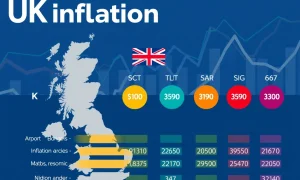Former Chancellor Jeremy Hunt has issued a stark warning about the UK’s economic future, arguing that proposed tax increases could severely damage the country’s entrepreneurial spirit. In a detailed analysis of current UK tax policy, Hunt contends that Chancellor Rachel Reeves’ approach risks pushing Britain into economic stagnation.
UK Tax Policy Clash: Hunt’s Growth Warning
Jeremy Hunt has directly challenged the government’s fiscal strategy, claiming that planned tax rises will undermine economic recovery. Consequently, he emphasizes that the current UK tax policy direction threatens long-term prosperity. Hunt specifically targets the projected £30bn tax increase scheduled for November’s Budget.
Economic Impact of Tax Increases
Hunt bases his argument on OECD data comparing economic performance across nations. Importantly, the evidence shows that countries with lower taxation consistently achieve stronger growth. For instance:
- Lower-tax economies grew 2% faster annually between 2010-2019
- US workers work 260 more hours yearly than high-tax counterparts
- Mississippi’s tax cuts transformed it into America’s fastest-growing state
Animal Spirits and Entrepreneurship
The concept of ‘animal spirits’ forms the core of Hunt’s critique of current UK tax policy. He argues that high taxation discourages risk-taking and innovation. Furthermore, Hunt suggests that the welfare system creates disincentives for work. Therefore, he believes the government’s approach will suppress the very energy that drives capitalism.
Comparative Tax Policy Analysis
Hunt contrasts his own tenure as Chancellor with Reeves’ current strategy. While acknowledging his temporary tax increases after the Truss crisis, he highlights his simultaneous introduction of growth measures. These included national insurance cuts and full expensing for business investment. Conversely, he characterizes Reeves’ approach as permanently increasing both borrowing and taxation.
Business Response to Tax Changes
Business leaders have expressed concern about the impact of rising employment costs. Many fear that increased taxation could lead to job losses and reduced investment. Consequently, the business community watches the evolving UK tax policy debate with apprehension.
Future of UK Economic Strategy
The fundamental disagreement reflects deeper philosophical differences about economic management. Hunt advocates for lower taxes to stimulate growth, while Reeves emphasizes fiscal responsibility and public service funding. This UK tax policy debate will likely define Britain’s economic direction for years to come.
Frequently Asked Questions
What are ‘animal spirits’ in economics?
Animal spirits refer to the emotional and psychological factors that drive economic decision-making, particularly entrepreneurship and risk-taking. John Maynard Keynes originally coined the term to describe the human emotions that influence economic behavior.
How much does Hunt claim taxes will increase?
Hunt projects that taxes will rise by £30bn in November’s Budget, bringing the total increase to £70bn over 13 months since the government took office.
What evidence does Hunt cite for lower taxes boosting growth?
He references OECD data showing that between 2010-2019, lower-tax countries like the US and South Korea grew significantly faster than high-spending nations like Finland and Denmark.
How does Hunt defend his own tax increases as Chancellor?
Hunt describes his tax hikes as temporary measures necessary to stabilize markets after the Liz Truss crisis, contrasting them with what he calls permanent increases under the current government.
What is the Mississippi tax example Hunt mentions?
Hunt points to Mississippi’s decade of phased tax cuts, which he says transformed it into America’s fastest-growing state with rising wages and reduced poverty.
How do businesses view the proposed tax changes?
Many business leaders express concern that increased employment costs could lead to job losses and reduced investment, creating uncertainty about the UK’s economic direction.








